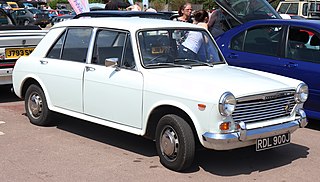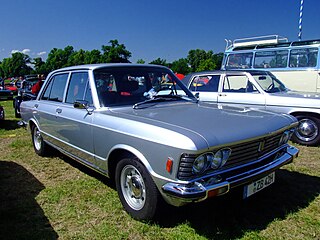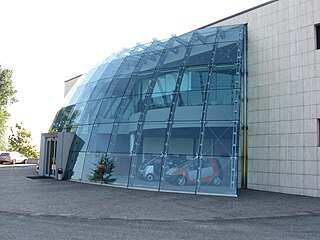
Maserati S.p.A. is an Italian luxury vehicle manufacturer. Established on 1 December 1914 in Bologna, Italy, the company's headquarters are now in Modena, and its emblem is a trident. The company has been owned by Stellantis since 2021. Maserati was initially associated with Ferrari. In May 2014, due to ambitious plans and product launches, Maserati sold a record of over 3,000 cars in one month. This caused them to increase production of the Quattroporte and Ghibli models. In addition to the Ghibli and Quattroporte, Maserati offers the Maserati GranTurismo and two SUV models, the Maserati Levante and the Maserati Grecale. Maserati has placed a yearly production output cap at 75,000 vehicles globally.

The Fiat 128 is a transverse front-engine, front wheel drive small family car manufactured and marketed by Fiat from 1969 to 1985 as a two- or four-door sedan, three- or five-door station wagon as well as two- or three-door coupé. The 128 running gear and engine, reconfigured for a mid-engined layout, were used in the Fiat X1/9 sports car.

The Fiat 124 is a small family car manufactured and marketed by Italian company Fiat between 1966 and 1974. The saloon superseded the Fiat 1300 and spawned station wagon, four-seater coupé, and two-seater convertible variants.

The Lancia Thema is an executive car produced by the Italian automaker Lancia between 1984 and 1994, and one of four cars to share the Type Four platform alongside the Alfa Romeo 164, Fiat Croma and Saab 9000. The Thema was first shown at the Turin Motor Show in 1984. The Thema was available as a saloon and as a station wagon designed and produced by Pininfarina.

The BMC ADO16 is a range of small family cars built by the British Motor Corporation (BMC) and, later, British Leyland. Launched in 1962, it was Britain's best-selling car from 1963 to 1966 and from 1968 to 1971. The ADO16 was marketed under various make and model names; however, the Austin 1100 and Morris 1100 were the most prolific of all the ADO16 variants. The car's ubiquity at the height of its popularity led to it simply being known as the 1100 (eleven-hundred) in its home market. Also made with a 1275cc engine, it was then typically called 1300.

The Fiat 130 is a large six cylinder executive car produced by Italian car manufacturer Fiat from 1969 to 1977. It was available as a 4-door saloon and as a 2-door coupé.

The Fiat 1100 is a small family car produced from 1953 until 1969 by the Italian manufacturer Fiat. It was an all-new unibody replacement for the Fiat 1100 E, which descended from the pre-war, body-on-frame Fiat 508 C Balilla 1100. The 1100 was changed steadily and gradually until being replaced by the new Fiat 128 in 1969. There were also a series of light commercial versions of the 1100 built, with later models called the Fiat 1100T, which remained in production until 1971. The Fiat 1100 D also found a long life in India, where Premier Automobiles continued to build the car until the end of 2000.

The Lancia Flavia is an executive car produced by Italian automaker Lancia from 1961 to 1971.

The Lancia Beta, stylised as Lancia β, was an entry-level luxury car produced by Italian car manufacturer Lancia from 1972 to 1984. It was the first new model introduced by Lancia after it had been taken over by Fiat in 1969.

Pininfarina S.p.A. is an Italian car design firm and coachbuilder, with headquarters in Cambiano, Turin, Italy. The company was founded by Battista "Pinin" Farina in 1930. On 14 December 2015, the Indian multinational Mahindra Group acquired 76.06% of Pininfarina S.p.A. for about €168 million.

The Fiat 124 Sport Spider is a convertible sports car marketed by Fiat for model years 1966–1985. Designed by and manufactured at the Italian carrozzeria Pininfarina factory, the monocoque, front-engined, rear-drive Sport Spider debuted at the November 1966 Turin Auto Show with styling by Tom Tjaarda.

The Fiat 850 is a small rear-engine, rear-wheel-drive car manufactured and marketed by Italian car manufacturer Fiat from 1964 to 1973.

The Lancia Flaminia is a luxury car produced by Italian automaker Lancia from 1957 until 1970. It was Lancia's flagship model at that time, replacing the Aurelia. It was available throughout its lifetime as in saloon, coupé and cabriolet body styles. The Flaminia coupé and cabriolet were coachbuilt cars with bodies from several prestigious Italian coachbuilders. Four "presidential" stretched limousines were produced by Pininfarina for use on state visits.

Franco Scaglione was an Italian automobile coachwork designer.

The Fiat 1300 and Fiat 1500 are a series of front-engine, rear-drive automobiles manufactured and marketed by Fiat from 1961 to 1967, replacing the Fiat 1400 and Fiat 1200 coupé, spyder and cabriolet. The 1300 and 1500 were essentially identical to each other except for their engine displacement, as indicated by their model names, and were offered in sedan/saloon, station wagon, convertible and coupé body styles which shared little mechanically with the other body styles except the 1500 engine.

The Fiat 1400 and Fiat 1900 are passenger cars produced by Italian automotive manufacturer Fiat from 1950 to 1958 and from 1952 to 1959 respectively. The two models shared body and platform, but while the 1.4-litre 1400 was Fiat's intermediate offering, the upmarket 1900 had an enlarged 1.9-litre engine and more luxurious trim and equipment, to serve as flagship in the manufacturer's range.
The Turin Motor Show is an auto show held annually in Turin, Italy. The first official show took place between 21 and 24 April 1900, at the Castle of Valentino, becoming a permanent fixture in Turin from 1938 having shared it with Milan and Rome until that time. From 1972, the show was held biannually and in 1984, it moved into Fiat's shuttered Lingotto factory.

The Alfa Romeo Spider is a two-seater, front-engined, rear-drive roadster manufactured and marketed by Alfa Romeo from 1966 to 1994 in four distinct generations, or "series", each with modifications ranging from modest to extensive.

The Fiat 1100 is a small family car produced from 1937 to 1953 by the Italian car manufacturer Fiat. It was introduced in 1937 as Fiat 508 C or Balilla 1100, as a replacement for the Fiat 508 Balilla. Under the new body the 508 C had more modern and refined mechanicals compared to the 508, including independent front suspension and an enlarged overhead valve engine. In 1939 it was updated and renamed simply Fiat 1100. The 1100 was produced in three consecutive series—1100, 1100 B and 1100 E—until 1953, when it was replaced by the all-new, unibody Fiat 1100/103.

The Fiat Pininfarina Cabriolet was a two-door, two passenger, front engine rear drive convertible manufactured by Pinin Farina, and marketed by Fiat across two generations, superseding the Fiat 1200 Spider.























